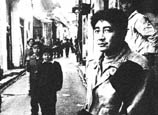
Forbes China, the Chinese language edition of Forbes magazine, has unveiled its second "30 Under 30" list of top Chinese entrepreneurs under the age of 30, showing that high-tech start-ups still dominate the ambitions of the country's tycoons of the future.
This year's members include founders of businesses involved in everything from online advertising to Internet companies in China, with eight of the 30 shortlisted entrepreneurs involved in Internet companies.
The southern business hub of Shenzhen is home to the most shortlisted young entrepreneurs, with the city's vibrant atmosphere and entrepreneurial spirit seen as the perfect breeding ground for the next generation of business leaders, the report said.
The average age of the young entrepreneurs is 27, with one third on the threshold of turning 30 next year, meaning more new faces are likely in next year's survey, which will become the third to be published.
Forbes published similar national lists for major countries around the world.
In the United States, the youngest is Nick D'Aloisio, who started up his computer program company Summly at the age of 17.
In the Chinese list, the youngest is 20-year-old Ji Yichao, who founded his Internet company Peak Labs at the age of 19.
The company staged its first launch in October last year with three products, including an Internet browser named Mammoth 5.
So far, the operation has received more than 1 million yuan ($160,000) of investment from the Chinese venture capital fund ZhenFund, and the investment firm Sequoia Capital.
"It really impresses me that a young man under 20 has developed such a cool browser totally by himself. Peak Labs' new product plan also sounds interesting," said Zhou Hongyi, the 41-year-old founder of the Chinese software company Qihoo 360 Technology Co Ltd.
"His challenge at the moment is not only product and technology innovation, but business leadership."
Tang Weiwei, the senior editor of Forbes China who helped draft the report, said that Internet start-ups are becoming even harder, with offline profits running much higher than purely online sales.
"The monopoly being enjoyed by the Internet giants has seriously stifled the opportunities of young entrepreneurs," said Tang.
"Start-ups were somewhat stagnant last year as investors were more careful. Even the most passionate of ideas or applications failed to get investment," she added.
But she said that 2012 also witnessed a renaissance in the manufacturing industry, helped by the rise of companies such as Seeed Studio, China's largest open-source manufacturer based in Shenzhen, which has begun a wave of customized and creative business models.
"Our products accelerate the process of hardware manufacturing, embodying their ideas into prototypes," said Pan Hao, Seeed's founder and executive director.
















 Year's first rainfall for Beijing
Year's first rainfall for Beijing


![]()
